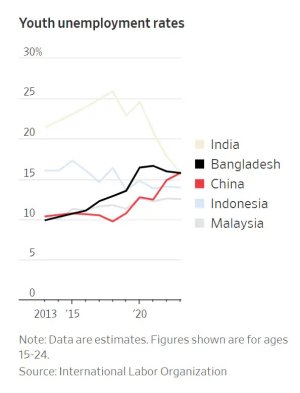ElRaja
ODI Debutant
- Joined
- Oct 7, 2010
- Runs
- 9,838
This follows from a conversation I had with one of my uncles discussing the current state of unrest around the world. While he argued that these events are part of a cyclical pattern, much like those we've seen in the past, I contended that the situation is fundamentally different this time.
I've always supported the idea of a meritocratic system, where individuals advance based on their abilities and efforts. However, it's becoming increasingly clear that the value of human labour is declining with each passing day. In the modern economy, the primary forms of capital available to individuals are intellectual and financial. Unlike physical labour, which has inherent limitations, the potential value generated by intellectual and financial capital is significantly higher and can scale without the same constraints.
A meritocracy based on physical labor seemed like a fair way to distribute resources, as everyone was limited to more or less a similar level of physical effort. However, a meritocracy driven by intellect and financial acumen is a much more complex and potentially problematic concept. The last few decades have shown that the most intelligent and wealthy individuals have been able to amass unprecedented levels of power and influence on a global scale. This concentration of wealth and power has contributed to growing economic inequality, as evidenced by numerous studies on the widening gap between the rich and the poor, particularly in the developed world.
It’s not surprising, then, that many of the participants in the riots in Northern England came from economically underprivileged backgrounds. Historically, the politics of division have been a key strategy for controlling resources and maintaining power. Yet, even if these individuals succeed in achieving short-term goals—such as reducing immigration or diminishing the influence of minorities in the UK—they are unlikely to see meaningful improvements in their economic situation. This is because the root causes of their discontent, such as economic inequality and lack of opportunity, remain unaddressed.
The most concerning aspect of this system is its inherent paradox: because it is meritocratic, those who are smart or resourceful enough will find a way to attain wealth and comfort, regardless of their starting position. As a result, the brightest individuals from disadvantaged backgrounds often end up supporting and perpetuating the very system that exploits those who are left behind. This creates a self-reinforcing cycle in which the underclass of increasingly out of demand people remains marginalized, and social mobility becomes increasingly difficult.
Given these dynamics, is it even possible to reform our systems to ensure that meritocracy benefits everyone, rather than deepening existing and growing inequalities?
I've always supported the idea of a meritocratic system, where individuals advance based on their abilities and efforts. However, it's becoming increasingly clear that the value of human labour is declining with each passing day. In the modern economy, the primary forms of capital available to individuals are intellectual and financial. Unlike physical labour, which has inherent limitations, the potential value generated by intellectual and financial capital is significantly higher and can scale without the same constraints.
A meritocracy based on physical labor seemed like a fair way to distribute resources, as everyone was limited to more or less a similar level of physical effort. However, a meritocracy driven by intellect and financial acumen is a much more complex and potentially problematic concept. The last few decades have shown that the most intelligent and wealthy individuals have been able to amass unprecedented levels of power and influence on a global scale. This concentration of wealth and power has contributed to growing economic inequality, as evidenced by numerous studies on the widening gap between the rich and the poor, particularly in the developed world.
It’s not surprising, then, that many of the participants in the riots in Northern England came from economically underprivileged backgrounds. Historically, the politics of division have been a key strategy for controlling resources and maintaining power. Yet, even if these individuals succeed in achieving short-term goals—such as reducing immigration or diminishing the influence of minorities in the UK—they are unlikely to see meaningful improvements in their economic situation. This is because the root causes of their discontent, such as economic inequality and lack of opportunity, remain unaddressed.
The most concerning aspect of this system is its inherent paradox: because it is meritocratic, those who are smart or resourceful enough will find a way to attain wealth and comfort, regardless of their starting position. As a result, the brightest individuals from disadvantaged backgrounds often end up supporting and perpetuating the very system that exploits those who are left behind. This creates a self-reinforcing cycle in which the underclass of increasingly out of demand people remains marginalized, and social mobility becomes increasingly difficult.
Given these dynamics, is it even possible to reform our systems to ensure that meritocracy benefits everyone, rather than deepening existing and growing inequalities?








